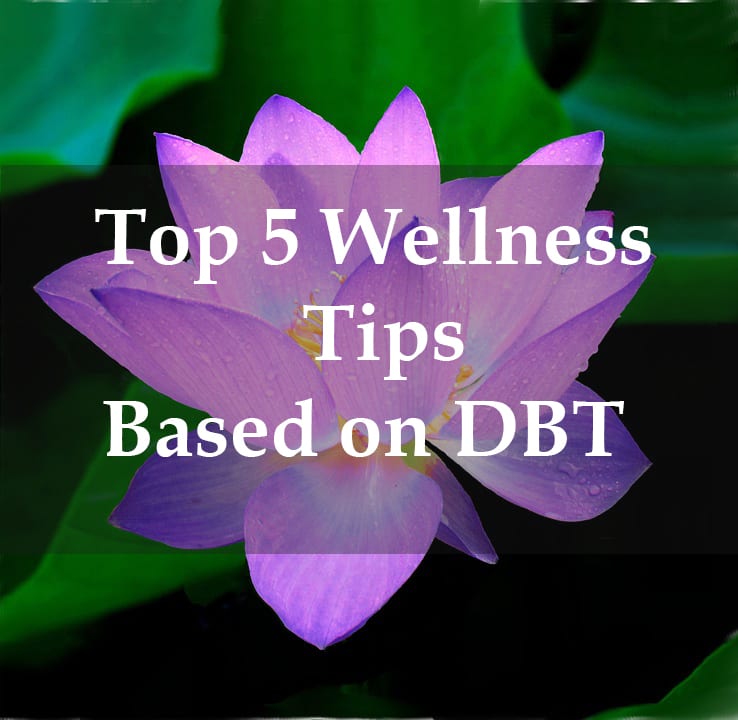Don’t you wish there was a way to magically feel better about yourself? Or that you could have less mood swings and less fights with your loved ones? There may not be any magic potions to fix everything in an instant but learning how to use Dialectical Behavior Therapy or DBT may be the next best thing. DBT is mainly used to treat individuals with borderline personality disorder as well as other mental health disorders. But the great thing about DBT is that you don’t have to have a mental health problem to benefit from its life-changing principles. Check out these tips for adding mental wellness into your life:
Top 5 Wellness Tips Based on DBT
1. Balance Your Desire for Change with Acceptance
Self-improvement is a big topic in our society. There are countless products, articles, books and TV shows all dedicated to making things better. It can be easy to get swept up in the desire to always be improving. While it’s a good thing to have goals, your mental well-being can suffer if you put too much pressure on yourself to always be progressing. You should want to improve your life or change your behavior because you genuinely want to grow as a person. But if you are striving for betterment because you feel you are not worthy of love, happiness or well-being the way you are then that is not a healthy desire for change.
Constantly putting yourself down for not being perfect is going to stand in the way of your happiness and your success. Learning how to accept yourself as you are and nipping negative self-talk in the bud are important parts of mental wellness. It can be truly amazing how your outlook can change when you take time for acceptance.
2. Learn to Be Present in the Here and Now
The Eastern practice of Mindfulness has a large influence on the principles of DBT. Spending too much time dwelling on the past or on the scary “what-ifs” of the future will only cause unpleasant emotions to spring up regardless of whether or not you have a mental health disorder. Mindfulness is designed to focus your mind’s energies on what is in the here and now—not what is in the past or future. It sounds easy but not letting your mind wander is harder than it looks.
There are various ways to improve your mindfulness and you don’t need to limit yourself to just one. You can meditate, exercise, cook, color or make art, read a book and much more. Finding something that helps you focus on the present will add a sense of calm to your daily routine.
3. Be Aware of Your Emotions
Emotions seem to spring up without warning and it feels impossible to let go of those feelings. Someone cutting you off might make your blood boil or a sad news story might have you feeling down all day. Don’t get me wrong, there is nothing unhealthy about having and expressing emotions but there are ways that can help you better manage your emotions.
First, you must slow down your reaction time and “watch” your emotions unfold. Then, identify the cause and effect of that feeling. For example, you can say to yourself or even write down “I feel disappointed because I did not get a second interview for a job I really wanted. It makes me want to give up.” The first step to better emotional stability is to be aware of what you are feeling, why you are feeling it and what the emotion makes you want to do. Now that you have identified your feelings and did not react instantly, you will be able to let that emotion ride itself out and you might realize it wouldn’t be a good idea to give up on a job search because of one failed attempt.
4. Take Notice of What You Tolerate
Distress tolerance is one of the major areas of focus in DBT. While it is perfectly normal to have bad days or find yourself in situations that are downright annoying, you need to make sure that your level of distress tolerance is not overly low or excessively high. If the smallest inconvenience or minor disagreement is causing you to blow up with rage or burst into tears, you need to think about the underlying reasons why you are feeling that way. Also, tolerating too much distress can be harmful to you. Remaining in dangerous situations or staying in a bad relationship is not healthy either.
Mindfulness can be a great tool for distress tolerance as it allows you to take stock of what is happening in the present without casting judgement on it. For example, you get cut off on the freeway and while you may be very irritated at this happening, you use Mindfulness to take note of the things around: the road, the taillights in front of you, and your hands’ position on the wheel. Your focus shifts from the feelings of irritation to the act of driving. This allows the emotional upheaval to calm down, making the situation less annoying or potentially dangerous than if you continued to drive distracted by intense feelings of agitation.
5. Understand the Power of Validation
Family members and loved ones have a unique talent for being able to push each other’s buttons. I’m sure I’m not alone in witnessing how one comment at a family function can spur a chaotic dispute. Chances are that lack of validation is one of the main reasons most family fights occur in the first place. To quote an article from PsychCenteral, validation is defined as “the recognition and acceptance of another person’s internal experience as being valid”.
Validation has a huge influence over everyone’s mental health. You need to feel validated by your loved ones and they need to validate your experience too. For example, your teenage daughter comes home crying because she thinks she failed the exam she just took at school. You know she studied hard and is a bright student so chances are she got a decent grade. Your first instinct might be to tell her she is over-reacting or being ridiculous because it’s obvious she is good at school. While that may come from a place of love, it didn’t validate your daughter’s internal experience of being upset over the exam.
Now this is where validation gets tricky. Validation does not mean agreeing with what the other is saying. You don’t have to agree with the daughter and say “I agree, you probably failed that test.” That is not a healthy form of validation at all. Instead you can say “I know that test was hard and it upset you but I’m sure you did better than you think. Do you want to talk about it?” Remember your mental or emotional health doesn’t exist in a vacuum and when it comes to validation, it’s a two way street. Understand how important validation is to others and help them understand how important it is to you.
The Golden Takeaway: It’s possible to be a happier and mentally healthier person if you learn how to accept yourself, manage your emotions, and understand everyone’s need for validation
Subscribe to our e-newsletter for more mental health and wellness articles like this one.
SUBSCRIBE NOW
Recommended for You
- Living Well with an Eating Disorder - July 18, 2017
- Living Well with Borderline Personality Disorder - June 13, 2017
- 6 Things that Everyone Thinks are Signs of Mental Illness but Aren’t - May 16, 2017






Another great article!